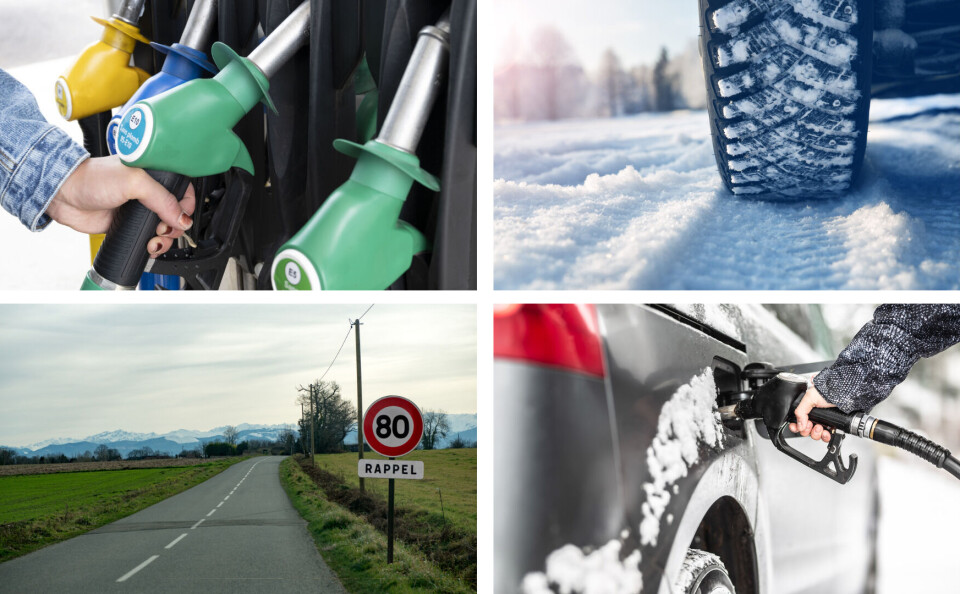-
White storks make strong return in France via nest ‘platforms’ and clipped wings
The Ligue pour la Protection des Oiseaux shares the conservation challenges in saving these birds from extinction
-
Hosting scheme in south-west France lets newcomers sample lifestyle
Households in nine Dordogne communes volunteer under Mes Nouveaux Voisins scheme
-
French boulangeries demand right for staff to work on May 1 so they can open
Artisan bakery owners can work but employees cannot, while certain industrial bakeries are allowed to remain open with workers
Winter tyres, 90km/h: Five November updates for drivers in France
From extended fuel discounts to snow tyres in certain departments, we look at what motorists should be aware of this month

1. Fuel discount is extended
The automatic ‘at-the-pump’ discount on fuel was set to drop to 10 cents per litre from November 1 (before being stopped at the end of the year) but the higher rate has been extended.
The recent shortage of fuel due to strike action at refineries in October has compelled the government to extend the 30 cent discount per litre for another 15 days, up to and including November 14.
Read more: France’s 30-cent ‘at the pump’ fuel discount to be extended
In addition, TotalEnergies’ 20-cent-per-litre discount has also been extended and will last until mid-November too, before dropping to 10 cents.
2. Winter tyre rules apply but no fines yet
From November 1, vehicles driving in mountainous areas should be equipped with winter tyres or snow chains.
This is because of the Loi Montagne, which applies to 48 French departments until March 31.
The law came into effect last year and this was due to be the first winter that €135 fines were levied for non-compliance, following an initial grace period.
However, the Ministry of Transport confirmed to RMC on Friday (October 28) that the grace period has now been extended until at least the end of the year.
While police will continue checks for the sake of informing drivers, no financial penalties will apply.
Read more: Reminder: Winter tyre rules enforced in French mountains from November
Eligible departments can choose to implement the Loi Montagne across their whole area, only in certain communes or not at all. You can find out more about the specific communes affected here.
Exceptions to the rule are cars fitted with studded tyres, but otherwise the law applies to all vehicles including vans, buses and lorries. It applies to tourists, visitors and residents.
Cars, camper vans and vans can either use four winter tyres or, failing this, carry fabric socks or metal snow chains in their boot.
3. Yonne department reverts to 90km/h
As of November 7, some roads in Yonne (Bourgogne-Franche-Comté) will revert back from 80km/h to a 90km/h speed limit.
The decision was taken by the departmental council despite advice to the contrary from France’s Road Safety Commission.
However, the change applies to a minority of roads in the department and only 10% (approximately 450km) of those currently at 80km/h will go back to 90km/h.
Yonne’s decision means almost half of departments have now raised speed limits on all or some of their roads, four years after an 80km/h limit was controversially imposed nationwide on many secondary roads, except dual carriageways, in June 2018.
Read more: Speed limits switch back to 90km/h on more French roads
In December 2019, after an outcry, departments were given the power to return to the original limit if they so chose.
4. Driving test booking available online nationwide
It is now possible to book your practical driving test slot online, no matter where you live in France.
The online reservation system started being rolled out in March 2020, but only in certain departments.
As of November 1, however, it is possible to access the system nationwide via a government platform.
The system aims to make it easier to book appointments and discourage absenteeism, which should cut waiting times.
No-shows without a valid reason will see candidates forced to wait 40 days before they can take a new test.
If you fail your test, re-booking times will be dependent on how well you performed the previous time. Those with better scores will have shorter waits.
Candidates who are affiliated with a driving school can use the driving school’s login details to access the site, and pick a time and date slot with their instructor.
Those doing it on their own – candidats libres – will have to first create an account. You will be able to choose the examination centre, date and time slot of your choice. You must also declare that you will be accompanied on the day of the test by someone with a French driving licence (Permis B) and provide a car with dual controls.
5. Winter diesel different approach
Some service stations start offering special ‘winter diesel’ (diesel grand froid), capable of withstanding temperatures down to -15C and -20C from November 1.
However, the general fuel shortage and unseasonably warm weather will see a different approach this month.
Read more: Fuel strikes renewed, what is the situation at French petrol stations?
Rather than being sold at separate pumps, the winter diesel, which is enhanced with additives to prevent it from gelling in cold weather conditions, will be mixed with conventional diesel.
The measure should relieve pressure on fuel supplies which are still under strain in several areas.
In the event of a drop in temperatures, affected service stations will have to inform their customers of the type of fuel available for sale, so motorists know whether it is suitable.
Related articles
Winter tyres, heating oil, fuel: 10 November dates to note in France
French fuel shortage: How to check stocks at your local petrol station
80 or 90km/h? French speed limit changes continue to cause confusion
























